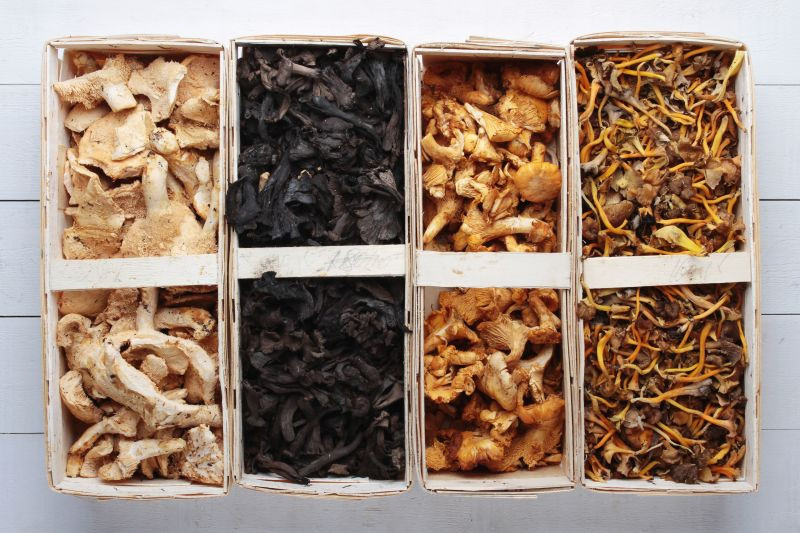A main course of mushrooms will never be found on many, if any, menus, but as a garnishment with assorted healthful benefits, mushrooms have few peers. Labeled as a superfood by nutrition experts, mushrooms are low in carbohydrates and calories and full of B vitamins, trace minerals, fiber and protein that make them a powerful anti-inflammatory food that also bolsters our immune system, among other health-inducing qualities. Although mushrooms are not at the top of everyone's lists when it comes to garnishing their meals – some folks are known to even make a special request they not be included – their overall popularity at the lunch or dinner table is indisputable. It isn't just the taste that attracts so many, mushrooms' medicinal qualities also make them appealing. Medicinal use of mushrooms dates back thousands of years in Asian countries, per draxe.com, and has been gaining steam in the U.S. and other western nations in recent decades. Not only are mushrooms great at fighting inflammation and bolstering our immune system, their antioxidant properties via bioactive molecules – meaning they also are an effective fighter against the potential damage of free radicals – make them useful for warding off viruses. There's little not to like about mushrooms, as even their brothy taste can turn an ordinary meal into a scrumptious delight.
Mushrooms Are Not Vegetables
Mushrooms are often thought to be vegetables, but technically they're not. They're actually a fungus with nearly incalculable numbers of different species. Scientists who have studied mushrooms have taken a stab at a number, estimating there to be more than 140,000 species of mushrooms in the world, although only about 14,000 have been identified and catalogued. In terms of a nutritional profile, it's almost impossible to find a flaw with edible mushrooms, the best-known types of which include cordyceps, reishi, crimini, portabella, white button, maitake, shiitake and oyster. In general, they not only skimp on cholesterol and calories, they also are low in sodium and fat, which is why they are also known as functional foods, as medicalnewstoday.com puts it. As a whole, unprocessed food, mushrooms apparently can reduce the risk of obesity, diabetes, heart disease and overall mortality.Mushroom Health Benefits
Here's a breakdown, with some more detail, of the major health benefits of mushrooms, which also can be found ground up in nutritional supplement form:- Diabetes. The abundance of fiber in mushrooms has been shown to lower blood-glucose levels in people with type 1 diabetes, while improving the levels of blood sugar, lipids and insulin for those with type 2 diabetes.
- Digestion. Also, per medicalnewstoday.com, the fiber – such as that from grilled portabella mushrooms and stir-fried shiitake mushrooms – not only benefit the digestive system, but reduces the risk of metabolic syndrome and heart disease.
- Anti-aging. Cordyceps mushrooms, in particular, help produce ATP, a primary fuel for our bodies to run on. Per draxe.com, they can help bolster our stamina and endurance; in Chinese folk medicine, they are referred to as invigorants.
- Heart Health. In addition to the fiber found in mushrooms, the potassium and vitamin C also play a part in cardiovascular health. The combination of abundant potassium and scarcity of sodium helps in lowering unhealthy high blood pressure levels., while the beta-glucan sourced from shiitake mushrooms has been shown to lower bad cholesterol levels.
- Weight control. The dietary fiber found in mushrooms – beta-glucans and chitin – serve as bulking agents in the digestive system. This promotes satiety while diminishing appetite, making us feel fuller quicker and longer, thus reducing our caloric intake.
- Vitamin D. Per besthealthmag.ca, mushrooms also contain something rarely found in other edibles such as fruits and vegetables – vitamin D, which mushrooms get from their exposure to sunlight as a plant. Portabellas fortified with vitamin D are sold in the U.S.
- Immune system. A study of mice published by the American Society for Nutrition found that white button mushrooms can enhance immune function by ramping up the production of antiviral and other cell-released proteins that can help protect and even repair our body's tissues. Invading microbes beware!
- Metabolism. The B vitamins found in mushrooms help our bodies metabolize fats and proteins, and are key for converting food (carbohydrates) into the fuel (glucose) burned by our bodies to produce energy. Crimini mushrooms as well as the white button and oyster varieties come highly recommended when it comes to kick starting our metabolism.
- Brain function. Mushroom's B vitamins also have been shown to aid in neurotransmission function, helping us to cut through brain fog, as draxe.com puts it. Also, some types of mushrooms, such as reishi, can lower cortisol, helping to produce more upbeat moods.

